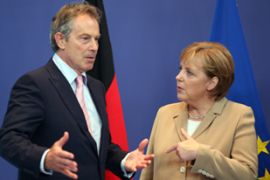EU summit opens amid differences
British premier says he will not sign up to a treaty unless key demands are met.

“The four areas we have set down, we do need satisfied and we do need satisfied in full,” Blair said at his last EU summit.
High stakes
Failure to reach an agreement could force smaller countries into a coalition and make richer countries more reluctant to aid poorer newcomers.
Blair said prospects for a deal on a new treaty were “touch and go”.
Jose Manuel Barroso, the European Commission president, was more optimistic. “The many contacts I had today confirmed to me a deal is possible – but it will certainly be very difficult, very tough,” he said.
|
“We should stop this constitutional strip-tease. We’ve gone far enough” Ursula Plassnik, Austrian foreign minister |
Angela, Merkel, the German chancellor, chairing the talks under Germany‘s EU presidency, urged leaders not to obstruct a deal.
“I hope that all work in a spirit that will allow us to achieve a fair agreement because the EU needs to be effective in order for us to solve the many problems in the world together,” she said.
Most EU countries favour keeping the voting formula set out in the constitution draft, but Poland says it favours bigger countries, especially Germany.
Marek Cichocki, a Polish negotiator, said conditions had been created for a summit deal of some kind, but said some issues might have to be held over to an inter-governmental conference.
Eighteen EU nations have ratified the constitutional treaty, but there is broad agreement to cut it significantly, which would allow France, the Netherlands and the UK to avoid risky referendums.
Some key institutional arrangements are set to be kept, such as creating a president of the European Council of governments elected for two and a half years instead of the current six-month rotating presidency which has grown in the enlarged EU.
Britain does not want to be legally bound by any treaty on the bloc’s Charter of Fundamental Rights, which includes a broadly defined right to strike.
It also wants to shrink the powers of a proposed EU foreign minister, seeks an opt-out from EU justice co-operation and opposes obligatory social security payments to migrants.
Ursula Plassnik, Austrian foreign minister, said: “We should stop this constitutional strip-tease. We’ve gone far enough.”